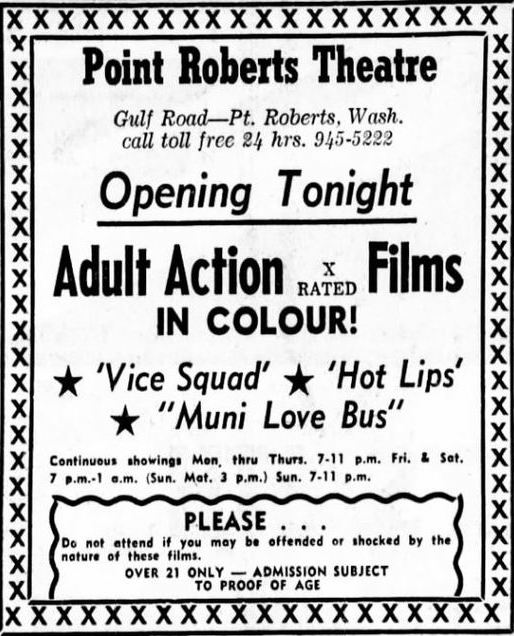Tuesday, April 25, 1978
DEFIANCE. Music by Jack Mallow. Written and directed by Armand Weston. Running time: 72 minutes. Rated X.
STRANGERS. No music credited. Written and directed by David Spelvin. Running time: 82 minutes. Rated X.
ACCORDING TO MARY-LOU McCAUSLAND, B.C.'s director of film classifications, the Blaine and Point Roberts theatres place large ads in The Province because “their market is here.” Dave Johnson agrees.
Johnson manages the Point Roberts Theatre, located on Gulf Road just south of the international boundary in Point Roberts, Washington. ‘”At least 90 percent of our business comes from Canada,'' he says.
Built at a cost of $125,000, the 195-seat movie house was originally owned by a Canadian holding company founded by Harry Wong of Vancouver. It opened on February 4, 1971, offering the long-established sex-exploitation theatres in Blaine their first real competition.
Currently owned by a Seattle businessman named Roger Forbes, it continues to compete for an ever-increasing audience. Though it opened with a policy of no one under 21 admitted, the age restriction has dropped to the rather more liberal 18. The price of a ticket remains $5.
A larger audience has brought about a number of changes in the adult entertainment business. Not only have America's professional pornographers improved the technical quality of their product, but they're developing more complex plotlines, and searching for performers with genuine acting ability.
Of the two films now showing [1978] in Point Roberts, Strangers, made in 1972, is the tamest. Writer-director David Spelvin [Anthony Spinelli] has concocted a story that would have been interesting even without the requisite hardcore footage.
His protagonists, Paul and Andrea (Michael and Michele Simon), are a couple trying to revive a stale marriage. They decide to try swinging, an experience that proves rather less attractive in practice than in theory.
In a surprisingly realistic turn of events for a sexually-explicit film, Spelvin has his characters develop a deeper appreciation for one another. His film is a basic reaffirmation of monogamy. Despite generally banal dialogue, seven original songs give his picture a nice, sincere feeling.
Defiance [a.k.a. The Defiance of Good], made in 1974, is meant to be a shocker. Its writer-director, Armand Weston, crosses the madhouse horrors of 1948’s The Snake Pit with The Story of O (1975). Presumably made for the entertainment of the sado-masochistic crowd, it's less of a gross-out than any one of the recent Ilsa epics.
Suburban teenager Kathy Taylor (played by the very not teenaged Jean Jennings) is caught sampling cocaine. Her parents commit her for two weeks of psychiatric examination, during which she is gang-raped by her fellow inmates.
When apparently sympathetic Doctor Gabriel (Fred Lincoln) offers to transfer her to his private sanitarium, a place for ''runaways with problems of growing up,'' she jumps at the chance. No one tells her that Gabe, a defrocked fundamentalist minister, is the biggest weirdo of them all.
Like director Just Jaeckin’s O, Kathy is destined for a life of sexual slavery. She arrives at Gabriel’s gothic mansion to be informed that “I have my own system of treatment here.” Amidst a lot of blather about good and eviI, the doctor’s henchpeople introduce the kid to the usual assortment of whips, chains, ropes and leathergoods.
It wouId be difficult (and rather foolish) to make generaIizations about current [1978] porno trends on the basis of two films, especially since neither is really new. Let's just say that this particular program does not emphasize the joy of sex.
A turn-on, it’s not.
The above is a restored version of a Province feature by Michael Walsh originally published in 1978. For additional information on this archived material, please visit my FAQ.
Afterword: Point Roberts is what is known as a "pene-exclave," which is defined as that part of the territory of one country that can be accessed by land only by passing through the territory of another. It is that little bit of Washington State — 12.65 km² or 4.884 square miles — that Americans can reach only after a 40 km (25 mile) drive through Canada. A triumph of treaty over topography, it was an unintended consequence of the 1846 Oregon Treaty that established the 49th Parallel as the border between the the United States and Britain’s colonial territories. Only after the deal’s signing (in Washington, D.C.) did a survey team discover that the boundary sliced through the Tsawwassen Peninsula.
Though the Brits suggested that it be left to them, the forward-looking Americans insisted on the letter of the law. And darned if, 125 years later, the Point Roberts Theatre wasn’t able to take advantage of its Canada-adjacency to play the sort of movies that could not be shown in British Columbian cinemas due to the prevailing censorship system. Alas, unbeknownst to the pene-exclave’s entrepreneurs, the province’s enlightened Chief Censor Ray MacDonald had already begun a shift from cutting to classification, a process that would be brought to its logical conclusion by his successor Mary-Lou McCausland. By 1981, X-rated entertainment was an option in B.C. movie houses and, after a decade-long run, the Point Roberts Theatre closed its doors.
